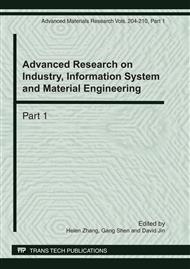[1]
F. Benabdelaziz, P. Lang and R. Nadeau: Pointwise Efficiency in Multiobjective Stochastic Linear Programming. Journal of Operational Research Society. Vol. 45 (2000), pp.11-18.
DOI: 10.2307/2583860
Google Scholar
[2]
G. De. Cooman, E.E. Kerre and F. Vanmassenhove: Possibility theory: an Integral Theoretic Approach. Fuzzy Sets Syst. Vol. 46 (1992), pp.287-299.
DOI: 10.1016/0165-0114(92)90143-r
Google Scholar
[3]
Y.D. Hu: The Efficient Theory of Multiobjective Programming (Shanghai Since and Technology Press, China 1994).
Google Scholar
[4]
G.J. Klir: On fuzzy-set Interpretation of Possibility Theory. Fuzzy sets and Systems. vol. 108 (1999), pp.263-273.
DOI: 10.1016/s0165-0114(97)00371-0
Google Scholar
[5]
P. Kall and S.W. Wallace: Stochastic Programming (Chichester, Wiley 1994).
Google Scholar
[6]
B.D. Liu, Uncertainty theory: An Introduction to it's Axiomatic Foundations (Springer-Verlag, Germany 2004).
Google Scholar
[7]
B. Liu: Toward Fuzzy Optimization without Mathematical Ambiguity. Fuzzy Optimization and Decision Making. Vol. 1 (2002), pp.43-63.
Google Scholar
[8]
B. Liu: Fuzzy Random Dependent-Chance Programming. IEEE Trans. Fuzzy Syst. Vol. 9 (2001), pp.721-726.
DOI: 10.1109/91.963758
Google Scholar
[9]
B.D. Liu: Theory and Practice of Uncertainty Programming ( Physica-Verlag, Heidelberg 2002).
Google Scholar
[10]
B. Liu: Uncertain Programming (Wiley, New York 1999).
Google Scholar
[11]
B. Liu: Random Fuzzy Dependent-Chance Programming and its Hybrid Intelligent Algorithm. Information Sciences. Vol. 141 (2002), pp.259-271.
DOI: 10.1016/s0020-0255(02)00176-7
Google Scholar
[12]
B. Liu and Y.K. Liu: Expected Value of Fuzzy Variable and Fuzzy Expected Value Models. IEEE Trans. Fuzzy Syst. Vol. 10 (2002), pp.445-450.
DOI: 10.1109/tfuzz.2002.800692
Google Scholar
[13]
Y.K. Liu and B. Liu: Expected Value Operator of Random Fuzzy Variable Operator. International Journal of Uncertainty, Fuzziness, Knowlledge-Based Systems. Vol. 11 (2003), pp.195-215.
DOI: 10.1142/s0218488503002016
Google Scholar
[14]
Y.K. Liu and S. Wang: Theory of Fuzzy Random Optimization (China Agricultural University Press, Beijing 2006).
Google Scholar
[15]
C.Y. Lin and J.L. Dong: The Efficient Theory and Method of Multiobjective Programming (Jilin Educational Press, China 2006).
Google Scholar
[16]
B.J. Ma: The Efficient Rate of Efficient Solution to Linear Multiobjective Programming. Journal of Systems Engineering and Electronic Techology. Vol. 2 (2000), pp.98-106.
Google Scholar
[17]
I.M. Stancu-Minasian: Stochastic Programming with Multiple Objective Functions (Buckarest 1984).
Google Scholar
[18]
Z. Wang, and J. Klir: Fuzzy Measure Theory (Plenum Press, New York 1992).
Google Scholar
[19]
A.V. Yazenin: Fuzzy and Stochastic Programming. Fuzzy Sets Syst. Vol. 22 (1987), pp.171-180.
DOI: 10.1016/0165-0114(87)90014-5
Google Scholar
[20]
R. R. Yager: A Foundation For a Theory of Possibility. Journal of Cybernetics. Vol. 10 (1980), pp.177-204.
Google Scholar
[21]
J. Zhou and B. Liu: Analysis and Algorithms of Bifuzzy Systems. International Journal of Uncertainty. Fuzziness and Knowledge-Based Systems. Vol. 12 (2004), pp.357-376.
DOI: 10.1142/s0218488504002874
Google Scholar
[22]
L.A. Zadeh: Fuzzy Sets as a Basis for a Theory of Possibility. Fuzzy Sets and Systems. Vol. 1 (1978), pp.3-28.
DOI: 10.1016/0165-0114(78)90029-5
Google Scholar


